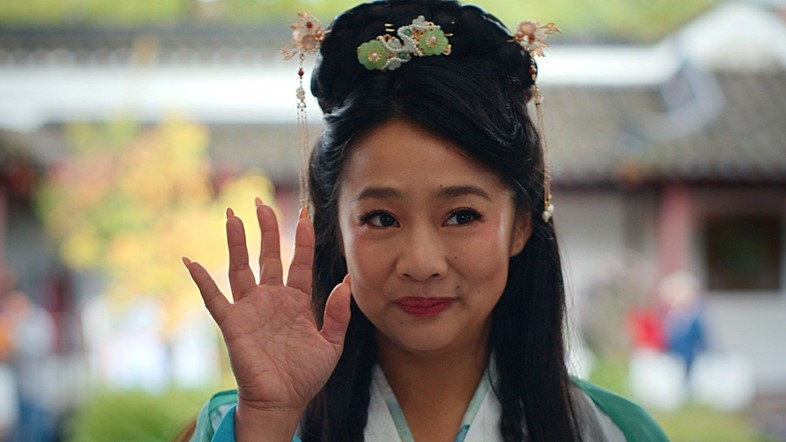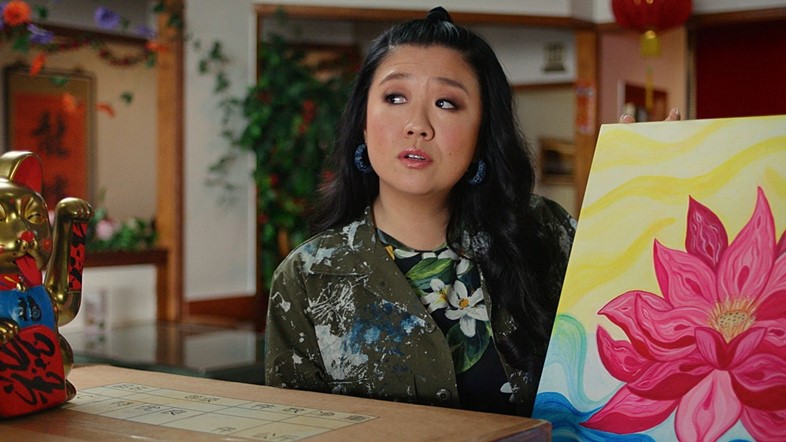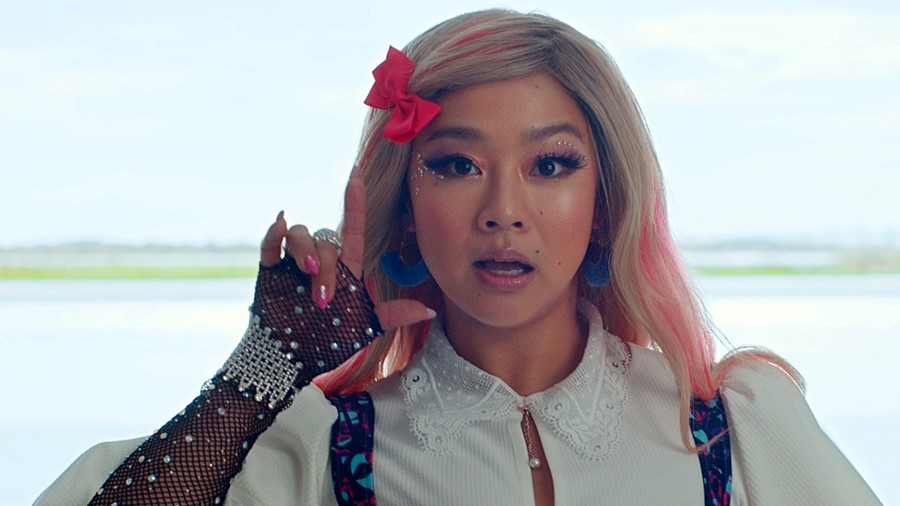As chaotic buddy comedy Joy Ride hits cinemas, co-stars Sherry Cola and Sabrina Wu talk about why this film “isn’t afraid to rock the boat”
Is there anything a hotshot lawyer won’t do for a promotion? In Adele Lim’s chaotic buddy comedy Joy Ride, Ashley Park’s Audrey finds herself on a career-making business trip to her native country of China, trying to seal the deal with her boss’s would-be business associates while best friend Lolo, Lolo’s cousin Deadeye and college roommate Kat tag along to provide translation and comic relief, though not necessarily in that order. When the stuffy businessmen discover she is adopted, they demand Audrey tap into her heritage and seek out her birth mother, propelling a breakneck, white-knuckle comedy of errors featuring mistaken identities, projectile vomiting and baggies of cocaine galore.
The domain of the gross-out comedy has long been the purview of men, but Joy Ride grapples with the prescriptions of the genre, offering its four protagonists space to be disgusting, desperate and desultory – space to set an example by setting, well, the very opposite. It’s a refreshing spin on the formula from Lim, a co-writer on Crazy Rich Asians, and one that allows its lead performances to shine in just how absurd they can be.
Here, we sit down with Sherry Cola, who plays the no-holds-barred Lolo, and Sabrina Wu, who plays the charmingly deadpan Deadeye, to talk about breaking stereotypes, redefining genre and how to be in on the joke.
Anahit Behrooz: Joy Ride is very much a film about outsiders. Ashley Park’s Audrey feels on the outside of her culture because of her adopted identity, but both of your characters – despite being more rooted in their families and heritage – also feel on the outside of things. How did you want to approach this tension between belonging and not belonging?
Sherry Cola: Lolo is so special because she’s the most liberated version of myself I’ve ever portrayed. She’s so loud, so in your face, so proud of who she is. But there are [also] insecurities – feelings of wanting to evolve but being stuck, which are so universal. She wants to belong in some way and she sees her friend Audrey maybe slipping through her fingers. I think that’s just so relatable: these friendships between people who are so different but are puzzle pieces, so in their outsiderness they become insiders with each other. Lolo has this ambition, this hunger to do something with her life, but sometimes we don’t have the resources. [It’s] the case with AAPI [Asian American Pacific Islander] folks in Hollywood: the majority of us don’t have famous parents so where do we even start to get into this career? I think Lolo is a lot of us.
Sabrina Wu: When I originally read the lines for Deadeye I was like, “Oh, this is giving like Alan from The Hangover,” where they’re just an oddball. I spent a lot of time collaborating with the writers and trying to get specific about what Deadeye is looking for. They’re somebody who is so themselves and hasn’t necessarily learned how to behave in socially acceptable ways, and is searching for genuine connection. I thought a lot about what I was like in middle school, when I was the least self-conscious version of myself. [With] Deadeye, we see they’re very sensitive to rejection because I’m sure they face it a lot, but they also wear their heart on their sleeve in a way that is really admirable. They’re so themselves in terms of [their] gender and interests – I think it’s hard to really, earnestly love the things that you love and be yourself in a true way.

AB: Sherry, you said Lolo is the most liberated version of yourself. I’m curious what parts you tapped into when embodying the character?
SC: I identify as bisexual and there are little bits in the film, like when Lolo is in the airport and mentions, “If you’re in Beijing and you have a juicy peen or vajeen …” That meant a lot to me. [Laughs]. It’s refreshing to see someone on the screen that redefines and shatters all the boxes that Asian women have been put in by Hollywood. She is exactly who I thought Margaret Cho was when I watched her standup when I was young. Like, “Oh my God, everything that comes out of her mouth proves people wrong.” She is so not the stereotype that people wanted us to be. [Similarly], Lolo isn’t afraid to rock the boat. This whole film isn’t afraid to rock the boat – we rock the plane, we rock the train.
AB: Sabrina, was it also important to you to bring parts of your queer identity into the role?
SW: It was neither that I added it or the writers intended it originally, but looking at the script, Deadeye would say things like, “My legal name is Vanessa, call me Deadeye.” And if you read their lines, it’s just … there’s not a tonne of … They just seemed non-binary to me. [Laughs].
AB: This kind of gross-out, raunchy comedy has been traditionally reserved for white, cis-het men. Do you see something empowering in moving into this genre?
SC: Absolutely. I think this film proves that we are far from the model minority. It’s OK to make mistakes. It’s OK to be messy. It’s OK to go on this chaotic adventure and get into trouble. I was all over the place in my early twenties, just partying and in college for seven years – I really didn’t have my shit together and was just figuring it out. And Joy Ride is about people figuring it out.
What’s been missing on screen is Asian people making fun of themselves in a genuine, authentic way. We’ve been the punchlines and the butt of the joke for years in TV and film, and now we’re taking ownership of our identities and reclaiming the culture. Whether it feels like an inside joke or not, it’s us sharing our side of the story and saying, “Oh, honey, we’ll take it from here. We’ll make fun of ourselves, thank you.”

AB: Sabrina, your previous experience has been largely in standup and comedy writing. Did you find this helped in transitioning into acting?
SW: I mean, it was very scary to be a lead in a film at this level for a first role, especially when I wasn’t even familiar with a lot of the jargon. It sort of felt like I was in a different country: learning a language but also learning the culture. Like, is it rude if I ask for another take or is that totally normal?
I mean, the truth is that I was only 23 and I had just graduated college – I’d only done one writing gig [which] was also really scary and big. I was entering the world as an adult, so I’m not sure I was even super comfortable with standup or writing before being thrust into acting. It was that time of my life where I had to learn fast and be a sponge. Every day I was like, “I just need to not act like a 23-year-old. I’m 50, I’m 50 and I’ve been doing this my whole life and no one is going to fire me.” [Laughs]. That was my mantra.
Joy Ride is out in UK cinemas on August 4.
